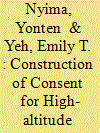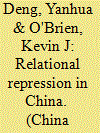|
|
|
Sort Order |
|
|
|
Items / Page
|
|
|
|
|
|
|
| Srl | Item |
| 1 |
ID:
192185


|
|
|
|
|
| Summary/Abstract |
In 2018, the Tibet Autonomous Region began resettling pastoralists from high-altitude areas to newly built settlements in distant, lower-altitude farming locations under the “extremely high-altitude ecological resettlement” programme, with a stated dual purpose of environmental protection and improving pastoralist well-being. The programme is said to be based on a principle of “government guidance and voluntary participation.” However, despite its stated “voluntary” nature, the government reports a 100 per cent rate of agreement to participate. After examining the ecological rationales for resettlement and pastoralists’ reluctance to move owing to livelihood concerns and attachment to homeland, the article examines how consent is achieved. Based on official documents and reports as well as semi-structured interviews with officials and pastoralists in Nagchu Municipality, the core target area for the programme, the article identifies a three-step “thought-work” oriented process – beginning with an initial survey, followed by group incentives and warnings and then individual incentives and warnings – which is deployed until pastoralists sign a resettlement agreement. The process illustrates the dialectical relationship between coercion and consent.
|
|
|
|
|
|
|
|
|
|
|
|
|
|
|
|
| 2 |
ID:
182948


|
|
|
|
|
| Summary/Abstract |
This article explores a facet of the Chinese propaganda apparatus that has yet to receive sufficient academic attention: the murky ecosystem of “semi-official” party-state presences on Chinese social media. With a particular focus on WeChat public accounts, this investigation responds to two critical research questions: first, what differentiates official party-state social media presences from semi-official presences, and second, what unique role do semi-official WeChat accounts play in the contemporary Chinese propaganda apparatus? This article samples content published by five dyads of official and semi-official WeChat public accounts during the first fifteen days of June 2019. The results of this comparative, case-study-based discourse analysis support two conclusions. First, semi-official WeChat accounts posture as independent from the party-state in order to attract large followings and gain credibility. Second, semi-official WeChat public accounts operate as “astroturfed influencers,” enabling the Chinese propaganda apparatus to covertly manipulate online discourse with extraordinary efficiency.
|
|
|
|
|
|
|
|
|
|
|
|
|
|
|
|
| 3 |
ID:
124639


|
|
|
|
|
| Publication |
2013.
|
| Summary/Abstract |
Chinese local officials frequently employ relational repression to demobilize protesters. When popular action occurs, they investigate activists' social ties, locate individuals who might be willing to help stop the protest, assemble a work team and dispatch it to conduct thought work. Work team members are then expected to use their personal influence to persuade relatives, friends and fellow townspeople to stand down. Those who fail are subject to punishment, including suspension of salary, removal from office and prosecution. Relational repression sometimes works. When local authorities have considerable say over work team members and bonds with protesters are strong, relational repression can help demobilize protesters and halt popular action. Even if relational repression does not end a protest entirely, it can limit its length and scope by reducing tension at times of high strain and providing a channel for negotiation. Often, however, as in a 2005 environmental protest in Zhejiang, insufficiently tight ties and limited concern about consequences creates a commitment deficit, partly because thought workers recognize their ineffectiveness with many protesters and partly because they anticipate little or no punishment for failing to demobilize anyone other than a close relative. The practice and effectiveness of relational, "soft" repression in China casts light on how social ties can demobilize as well as mobilize contention and ways in which state and social power can be combined to serve state ends.
|
|
|
|
|
|
|
|
|
|
|
|
|
|
|
|
|
|
|
|
|